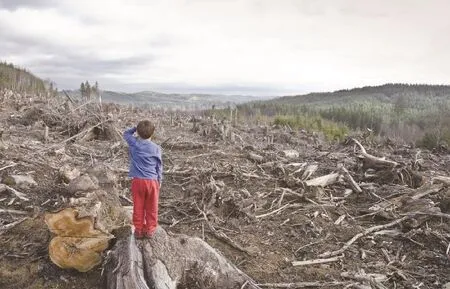无声的自然界
by John Vidal Joyce 译
无声的自然界
by John Vidal Joyce 译

在越来越多生物灭绝的同时,一种不太受人类关注的资源也在慢慢消失——自然界的声音,试想一下,如果有一天,我们只能从电子设备上听到大自然的声音,那将是何其悲哀!
when musician and naturalist Bernie Krause drops his microphones into the1)pristine coral reef waters of Fiji, he picks up a2)raucous mix of sighs, beats,3)glissandos, cries, groans, grunts, hits and clicks.
The water4)pulsates with the sound of creatures vying for5)acoustic bandwidth. He hears6)crustaceans, parrot fish,7)anemones,8)wrasses, sharks, shrimps, puffers and9)surgeonfish. Some10)gnash their teeth, others use their bladders or tails to make sound. Sea anemones grunt and belch. Every creature on the reef makes its own sound.
But half a mile away, where the same reef is badly damaged, he can only pick up the sound of waves and a few snapping shrimp. It is, he says, the desolate sound of extinction.
音乐家、自然主义者伯尼·克劳斯把扩音器放进斐济一片清澈的珊瑚礁海域,他听到一阵乱哄哄的声音:叹息声、拍打声、滑音、尖叫声、呻吟声、呼噜声、撞击声以及滴答声。
各种海洋生物争相发出声音,海水伴随着这些声音而跳动。他听到了贝类、鹦哥鱼、海葵、濑鱼、鲨鱼、虾、河豚和刺尾鱼发出的声音。有些海洋生物在咬牙,还有一些在利用它们身上的囊袋和尾巴发出声音。海葵发出咕噜咕噜的排气声。礁石里的每种生物都在发出自己的声音。
然而,在半英里之外的同一片礁石里,他只能听到海浪声以及一些虾在跳动的声音,这里的礁石受到了严重的破坏。他说,这是生物灭绝的荒凉之声。
1) pristine ['prɪstaɪn] adj. 干净的;质朴的
2) raucous ['rɔːkəs] adj. 喧闹的
3) glissando [glɪ'sɑːndəʊ] n. 滑奏法,滑奏部
4) pulsate ['pʌlseɪt] v. 搏动,跳动,有规律的跳动
5) acoustic [ə'kuːstɪk] adj. 有关声音的,听觉的
6) crustacean [krʌs'teɪʃjən] n. 甲壳类动物
7) anemone [ə'nemənɪ] n. 海葵
8) wrasse [ræs] n. 濑鱼
9) surgeonfsh ['sзːdʒənfɪʃ] n. 刺尾鱼,一种热带鱼,因其尾柄两侧多锐棘,像外科手术刀一样锋利,所以被称为“外科医生”
10) gnash [næʃ] v. 咬牙
Krause has spent 40 years recording over 15,000 species, collecting 4,500 hours of sound from many of the world’s pristine habitats.
But such is the rate of species extinction and the11)deterioration of these pristine habitats that he estimates half his recordings are now archives, impossible to repeat because the habitats no longer exist or they have been so compromised by human noise. His tapes are possibly the only record of the original diversity of life in these places.
“A great silence is spreading over the natural world even as the sound of man is becoming12)deafening,” he writes in a new book, The Great Animal Orchestra. “Little by little the vast orchestra of life, the chorus of the natural world, is in the process of being quieted. There has been a massive decrease in the density and diversity of key vocal creatures, both large and small. The sense of desolation extends beyond mere silence.”
Hawaii, he says, is the extinction capital of the world.“In a couple of centuries since the islands were populated by Europeans, half the 140 bird species have disappeared. In Madagascar, 15 species of13)lemur, an elephant bird, a pygmy hippo and an estimated half of all the animals have gone extinct.”
Even partially disturbed habitats lose much of their life for many years, says Krause. Recordings of a meadow in the Sierra Nevada Mountains east of San Francisco before the surrounding forest was selectively logged in the 1980s, sounds very different to when Krause returned a year later.
“The overall richness of sound was gone, as was the thriving density and diversity of birds. The only prominent sounds were the stream and the hammering of a Williamson’s14)sapsucker. Over the past 20 years I have returned a dozen times to the same spot at the same time of year, but the bio-acoustic vitality I had captured before logging has not yet returned.”
One in four mammals is threatened with extinction, he says. With the exception of a few sites, frog populations are in decline worldwide and birds are beginning to show radical signs of territorial shifting.
克劳斯花了40年的时间,走遍世界的原始生物栖息地,录下了15000种生物的声音,录制的声音长度达到4500个小时。
然而,越来越多的生物濒临灭绝,这些原始生物栖息地的环境也在不断恶化,克劳斯推测,他的录音现在有一半都已成为历史,无法重现,因为这些栖息地或已不复存在,或已被人类制造出来的噪声所侵扰。他的录音可能是记录下这些地方的原始生物多样性的唯一资料。
“随着人类的声音愈发震耳欲聋,自然界却逐渐变得一片死寂。”他在其新书《美妙的动物管弦乐团》中如此写道。“生命管弦乐团,自然界的大合唱正在一点一点地消失。动物主唱们的数量和种类已急剧下降,大型动物和小型动物皆是如此。这种荒凉感不仅仅是因为沉寂。”
夏威夷,他说,是世界上生物灭绝最严重的地方。“自欧洲人移居此处的几个世纪以来,原有的140种鸟类已经消失了一半。在马达加斯加,15种狐猴、1种象鸟、1种侏儒河马以及估计有一半的动物都已灭绝。”
多年来,即使是在只有局部遭到破坏的生物栖息地,也有许多生物遭到了灭顶之灾,克劳斯说道。克劳斯曾在旧金山东部的内华达山脉内的一片草原进行录音,之后,在上世纪80年代,这里周围的部分森林遭到了砍伐,一年后当克劳斯再次回到这里时,这里的声音已经不复当初。
“这里的声音不如以前那般丰富多样,鸟类的数量及种类也大大减少。唯一明显的声音是水流声以及威廉森吸汁啄木鸟敲啄树木的声音。在过去的20年间,我曾多次在一年的同一个时段回到同一个地方,但我录到的生物声音却始终没有再像森林被砍伐前那样富有活力。”
有四分之一的哺乳动物正面临着灭绝的危机,他说。全世界的青蛙数量都在减少,许多鸟类开始发出迁徙的信号,只有个别地区例外。

11) deterioration [dɪ,tɪərɪə'reɪʃən] n. 变坏,退化,恶化
12) deafening ['defənɪŋ] adj. 震耳欲聋的
13) lemur ['liːmə] n. 狐猴
14) sapsucker ['sæp,sʌkə(r)] n. 吸汁啄木鸟
15) pandemonium [,pændɪ'məʊnjəm] n. 喧嚣;大混乱;大吵大闹
16) consonance ['kɒnsənəns] n. 一致,调和

“Things are beginning to quiet down in the pristine habitats. The combination of shrinking habitats and increasing human15)pandemonium, have produced conditions under which the channels necessary for creature survival are being completely overloaded. The voices of the wild in their purest states where no [human] noise is present are splendid symphonies.”
But the wild natural world, comprised of vast areas not managed by humans, rarely exists now except for a few isolated spots like the Alaskan wilderness, the far Canadian north, Siberia, the pampas of Argentina and Uruguay, and the Brazilian Pantanal which he says are still rich with natural sound.
“The fragile weave of natural sound is being torn apart by our seemingly boundless need to conquer the environment, rather than fnding a way to abide in16)consonance with it.”
“原始的生物栖息地正在慢慢沉寂。栖息地的日益缩小以及人类活动的与日俱增使得各种生物的必要生存空间大大超出负载。不夹杂(人类)噪音、最纯粹的自然之声是一支支悦耳动听的交响曲。”
然而现今,除了一些与世隔绝的地方外,比如阿拉斯加荒野、加拿大北部偏远地区、西伯利亚、阿根廷和乌拉圭的潘帕斯草原以及巴西的潘塔纳尔湿地,尚未受到人类管制的荒野之地已所剩不多,克劳斯说在这些地方仍能听到丰富的自然之声。
“我们人类总想征服自然而非想办法与其和谐共处,我们对于征服自然环境的需求似乎永无止境,但我们的需求也正在一点一点地摧毁大自然那脆弱的声音。”
A Great Silence Spreads over the Natural World

